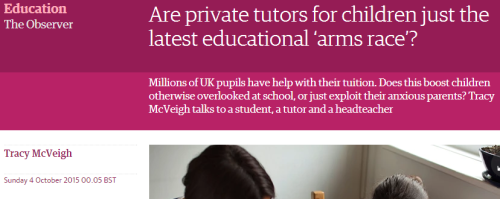
Below is the long version of a recent comment piece I wrote for for The Observer:
If I were to create a word cloud based on most media depictions of private tuition, the ‘tutoring arms race’ would undoubtedly loom large. For anyone unfamiliar with the concept, this is where unscrupulous tutors collude with angst-ridden tiger parents in the theft of childhood. No less prominent a tag would be that most vicarious of interests: the ‘super-tutor’ of the mega-rich. These elite twenty-somethings may be as comfortable teaching in a Swiss chalet as on board a yacht, but will occasionally let slip their disgruntlement with being treated as staff by their charges.
Thankfully, private tutoring in Britain is much more interesting than this. As the industry has grown in recent years, so has the research base, meaning that various stereotypes can now be challenged. Private tuition is no longer the preserve of the wealthy, but is used across society. In 2015, a quarter of children in the UK reported having received help from a private tutor, and among children from ethnic minority groups the proportion was around half. Research from The Tutor Pages puts the current average cost of private tuition within reach of many families: at under £30/hour for KS1 to KS3, £32/hour for GCSE, and £35/hour for A-level.
To get to the heart of the popularity of this burgeoning, sprawling phenomenon requires a willingness to step back and recognize (as so many parents have done) the intrinsic power of this form of learning. At its best, one-to-one tuition allows the fullest attention to be paid to what David Ausubel called the most important single factor influencing learning: “what the learner already knows. Ascertain this and teach him accordingly.” With the effectiveness of private tuition not in doubt , it is no surprise that this modus operandi is employed in so many contexts.
Parents will hire tutors for a multitude of reasons – for example, to help a child who has missed school due to illness, to support special educational needs or to supplement homeschooling. Yes, there are pupils being coached for school entrance exams, but we should bear in mind the proportions actually attending such schools (6.5% children are at independent schools and 5% at grammar schools). Yes, there are parents employing tutors because of perceived failures in state education, but if that were the whole story, why would pupils from independent schools be twice as likely as their state school counterparts to have a private tutor? Finally, tutoring has sometimes been criticized for its narrow focus on exams, but when surveyed, only half of children receiving private tuition said that it was to prepare for a particular test or examination.
The other half of the story often goes unreported, but it is the transformational educational experience offered by tutors, and many parents instinctively realise this. In some cases, a private tutoring session can be the first time a child has been recognized and valued as an individual, in contrast to the league table obsessed educational system they are immersed in. Increased self-reliance and confidence are often cited as outcomes of tutoring, sometimes because the child has finally felt able to express themselves without the threat of ridicule in the classroom. Private tutors are able to broaden a child’s horizons, act as a role model, instil a love of learning and more.
These often barely acknowledged factors contribute to the matrix of reasons for the popularity of private tuition, but there are deeper currents still. As I have argued elsewhere, private tuition in the UK needs to be set in an international context, where it is part of a worldwide trend. As with other areas of our lives moulded and enhanced by the digital age, employing a private tutor can be seen as part of a narrative of increased personal choice, flexibility and empowerment in our educational lives and those of our children.
Those who rail against private tuition prefer to ignore this larger shift, and the unique learning potential of the one-to-one format. Those who embrace it facilitate remarkable results, and in a huge diversity of contexts. Two of my favourite examples are British tutors using online tuition to share their expertise with families overseas, and the charity Action Tutoring which trains tutor volunteers to work in schools with young people facing socio-economic disadvantage.

Warning: Declaration of Social_Walker_Comment::start_lvl(&$output, $depth, $args) should be compatible with Walker_Comment::start_lvl(&$output, $depth = 0, $args = Array) in /var/www/vhosts/thetutorblog.com/httpdocs/wp-content/plugins/social/lib/social/walker/comment.php on line 18
Warning: Declaration of Social_Walker_Comment::end_lvl(&$output, $depth, $args) should be compatible with Walker_Comment::end_lvl(&$output, $depth = 0, $args = Array) in /var/www/vhosts/thetutorblog.com/httpdocs/wp-content/plugins/social/lib/social/walker/comment.php on line 42
Are private tutors just the latest educational ‘arms race’? | The Tutor Blog http://t.co/hQhCn0RK4H via @thetutorpages